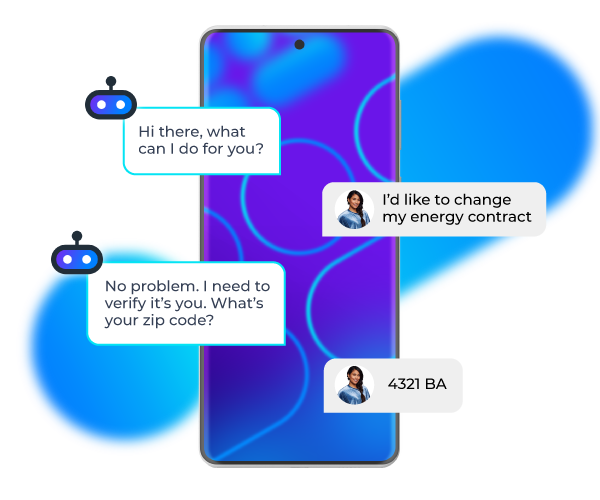What is Conversational AI?
Conversational AI (artificial intelligence) technology enables computers to engage in natural-sounding text conversations with customers. When chatbot interactions seem natural, consumers feel like they are having an organic social interaction.
Conversational AI uses data, natural language processing, and machine learning to mimic human interactions. It recognises human communication patterns and can be programmed to understand multiple languages. Conversational AI handles routine or repetitive customer questions, freeing up support staff to solve more complex issues. Speedy problem resolution saves your company time and money and leads to happier customers.
What’s the Difference Between Conversational AI and Chatbots?
Chatbots are transactional, utilising steps and responses that move customers through a predetermined chain of commands. Unlike conversational AI, chatbots use IFTTT (if-this-then-that) algorithms to interpret customer inquiries.
Conversational artificial intelligence asks open-ended questions that are interpreted and acted upon based on a self-generating and ever-expanding knowledge database.

Conversational AI and chatbots both engage in conversations with customers to answer common questions, handle support inquiries and facilitate sales. But there are some important differences between conversational AI and chatbots:
Understands human communication patterns and responds with contextual dialog.
Incorporates AI algorithms and natural language processing (NLP) technology to create smooth dialog transitions.
Creates customer conversations that don’t sound stilted or scripted and are often indistinguishable from human interactions.
Enables customers to resolve problems without human intervention, making customer service fast, natural, and seamless.
Retains context through a conversation.
Require “training” to recognise keywords.
Necessitate customers to use exact phrasing to generate correct predetermined responses.
Need continuously updated scripts to remain current and helpful.
How Does Conversational AI Work?
Conversational AI employs natural language understanding (NLU), machine learning (ML), and natural language processing (NLP) to engage in customer conversations. Natural language understanding helps decipher meaning from users’ words (even with their quirks and mistakes!) and remembers what has been said to maintain context and continuity.
Once a customer’s intent is understood, machine learning determines an appropriate response. This response is converted into understandable human language using natural language generation (NLG), a part of NLP.
NLP processes flow through a continuous feedback loop with machine learning to improve the computer’s artificial intelligence algorithms. Rather than relying on keyword-sensitive scripts, NLU creates unique responses based on previous interactions.
AI recognises patterns faster as data input increases. Along with human guidance, AI uses this information to form better, natural responses to customer inquiries over time.
Benefits of Conversational AI
Here are a few of the many benefits of using conversational artificial intelligence for customer support.
1. Increased Sales
Conversational AI can improve your conversion rate, increase revenue, and build your brand. Cross-selling, up-selling, product recommendations, and handling payment transactions are all easily managed by artificial intelligence tools.
2. Controlled Costs
Customer service staffing can be expensive. Offering 24/7 customer assistance via conversational AI apps reduces salary and training expenses. These savings are crucial for the survival and long-term success of SMBs.
3. Enhanced Customer Support & Engagement
Online assistants can provide many types of customer service, from answering questions about shipping status and delivery times to product advice and FAQs. Offering your customers 24/7 support (with minimal wait times) generates engagement by speaking to them when they need you most.
Artificial intelligence assistance ensures that customers receive accurate and consistent responses to their questions. Remember, if your AI app cannot sustain a rigorous customer inquiry, the request can be passed to a live agent with data generated from the automated interaction for reference.
4. Scalability
No need to worry about growing pains — conversational artificial intelligence applications can handle millions of conversations simultaneously. Whether you need to add resources or downsize rapidly, you can scale conversational AI applications to meet your needs and maximise operational efficiency.
5. Rich Data Insights
As conversational AI works to engage with customers actively, it’s also feeding your business rich data that you can use to learn about customers. This can give you a competitive advantage and reveal new business opportunities to explore.
6. Improved Employee Efficiency
Conversational AI takes the pressure off customer service agents by handling often-asked or repetitive questions for them. Live agents can focus instead on managing complex queries and building relationships with customers. Allow automation to address simple issues so your support staff can connect with customers, building engagement and loyalty.
7. Enhanced Accessibility
Make your business accessible for customers who rely on assistive technologies. Conversational artificial intelligence opens the door to groups who use language translation apps and text-to-speech dictation features.